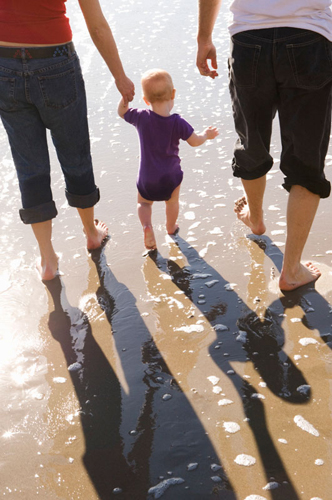Seeing you relax will allow your children to get to
know you as a whole person, rather than simply the person who comes home
from work and takes care of his every need. However, in reality, the
needs of adults who want to unwind don’t always mix smoothly with the
needs of toddlers.
“The true measure of a
nation’s standing is how well it attends to its children… their sense of
being loved, valued, and included in the families and societies into
which they are born.”
—“The true measure of a
nation’s standing is how well it attends to its children… their sense of
being loved, valued, and included in the families and societies into
which they are born.”
There is no reason why
there can’t be something for everyone on a family vacation. Each parent
can take turns to have time alone; or you may choose to go away with
another family with children so that you can all share responsibilities.
Young children are able to manage cultural activities in short bursts,
and anywhere that focuses on sporting events and outdoor activities is
bound to have a children’s play area, too.
Taking toddlers on vacation
Bear in mind that
young children do not need expensive vacations in luxury hotels. All
they want is your company and to have the freedom to explore and play.
Even though you are away from home, your toddler still needs his
routine. If you can anchor his days in a familiar pattern of sleep, eat,
and play, then he is more likely to adapt to the new places and
experiences that he is being exposed to—and less likely to become
fretful.
Pay attention to new
risks when you are away from home. Don’t leave your child unattended;
always use a child’s car seat and make sure he is safely strapped in;
encourage him to be aware of common dangers, and tell him what to do if
he is lost. For example, “Never go off with a stranger. Stay where you
are and wait for Mommy. I will come and find you.”
Vacation time
It’s important to block out time away with your family. Vacations
take forward-planning, flexibility, and a sense of humor but are a
benefit to all.

Special occasions
Whatever the
occasion—whether a birthday party, a wedding reception, a religious
festival, or simply a family dinner invitation—the idea of attending a
fancy occasion with your unpredictable toddler can be quite daunting.
The answer to preventing any problems and making events stress-free is
to plan ahead.
Ideas for managing special events:
Give your
toddler a choice of two or three toys and books that he can take with
him on the day. Having something absorbing and familiar to occupy or
distract him will make your life much easier.
If
your toddler is old enough, explain that you would like him to behave
well for the occasion and that, if he does, he will have a special
treat.
If it is to be
a formal occasion, play games of make-believe to help your toddler get
used to saying “Hello,” “Please,” and “Thank you.”
If
you are likely to be away from home beyond his normal bedtime, don’t be
shy about taking pajamas and wash things with you. Transporting him
home in his pajamas will reduce the upheaval when you get back.
If
he acts up on the day, make allowances. Remove him from the room and go
somewhere quiet. Normal behavior management rules apply;
but remember that a new place, new faces, and noise can be overwhelming
for a child. His only form of defense is to challenge you or withdraw
so that he knows you have remembered he is there.
The future
Whatever your hopes,
plans, and expectations of parenthood, your experience of being a parent
will be different from the one you expected: more joyous, more
delightful, more extraordinary—and also more tiring, rewarding, and
unpredictable than you would ever have believed possible!
Parenting is an
instinctive process that builds upon a number of emotions: love,
wonderment, fear, guilt, but, above all, pleasure. My heartfelt wish has
been to provide parents with honest and objective advice and choices
that put Mom or Dad back where he or she belongs—at the center of their
child’s life. Every one of us is responsible for the future care and
welfare of our children but, at home, and especially during the toddler
years, the most important person in your child’s life is you.